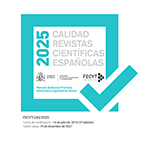Ficción literaria y educación: lo fantástico medieval en la narrativa juvenil
Abstract
The Middle Ages are a historical period in which real references go side by side with fictional ones in order to build a special type of imaginary. This is the time when the history of literature written in Romance languages begins, and, in consequence, it is unavoidable for young readers to have some knowledge of it. Apart from adaptations, as an attempt at simplification, within young adult literature, authors sometimes opt for drawing the readers` attention to classic works so that those works can be better known. In this way, in some history novels –the focal point of this study– we can perceive a rich intertextual network participating in both historiographical and fictional discourses. The analysis is centered on the trace of fantastic elements and the meaning acquired by them in relation to medieval literary tradition. Finally this type of narrative is connect with general fantasy to fix their impact on literary education of young readers.Le Moyen Âge constitue une époque où les références historiques se fusionnent aux fictives pour constituer un type spécial d’imaginaire. C’est en cette période que commence l’histoire de la littérature écrite en langue romane. Sa connaissance devient inévitable dans la formation des jeunes lecteurs. Mis à part les essais de simplification que constituent les adaptations, dans la littérature de jeunesse, les auteurs choisissent d’attirer l’attention sur les oeuvres classiques pour propager leur connaissance. Ainsi, dans quelques romans historiques, que nous allons analyser, on trouve un riche réseau d’intertextualité qui participe non seulement des discours historiographiques, mais aussi des discours fictifs. Notre analyse signale les traces du fantastique et de sa signification par rapport à la tradition littéraire médiévale. Finalement, nous allons situer ce type de narrative dans le cadre général de la littérature fantastique afin de déterminer son incidence dans l’éducation littéraire des lecteurs en formation.
Downloads
Article download
License
In order to support the global exchange of knowledge, the journal Didáctica. Lengua y Literatura is allowing unrestricted access to its content as from its publication in this electronic edition, and as such it is an open-access journal. The originals published in this journal are the property of the Complutense University of Madrid and any reproduction thereof in full or in part must cite the source. All content is distributed under a Creative Commons Attribution 4.0 use and distribution licence (CC BY 4.0). This circumstance must be expressly stated in these terms where necessary. You can view the summary and the complete legal text of the licence.










